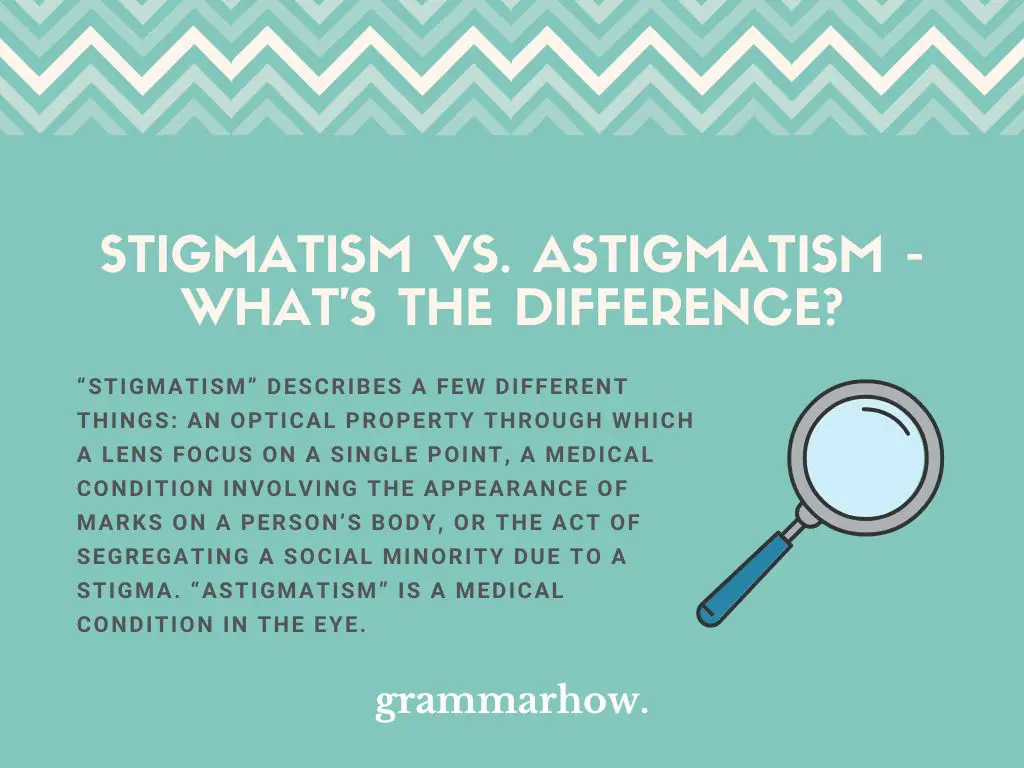Have you ever heard the word Stigmatism or Astigmatism and wondered what they meant? We want to know what those words mean and what’s the correct form for them.
Are “Stigmatism” and “Astigmatism” synonyms? Are they antonyms? How can we properly use them? Let’s find out!
Stigmatism vs. Astigmatism – What’s the Difference?
“Stigmatism” describes a few different things: an optical property through which a lens focus on a single point, a medical condition involving the appearance of marks on a person’s body, or the act of segregating a social minority due to a stigma. “Astigmatism” is a medical condition in the eye.

Take a look at the examples below:
- Astigmatism can be corrected with surgery in some cases.
- Stigmatism is often caused by a psychiatric condition.
“Stigmatism” and “Astigmatism” aren’t synonyms and don’t refer to the same thing. Therefore, those words can’t interchange.
Also, those words are complex and more commonly used in polished sentences, in formal environments. More than using those words in your sentences, it’s important to know what “Stigmatism” and “Astigmatism” mean.
To do that, let’s take a look at each word separately.
Stigmatism
“Stigmatism”, in Optics, is an image formation property of an optical system that focuses a single point source in object space into a single point in image space. It sounds complicated and it is. We’ll try to clarify it further ahead.
The Cambridge Dictionary doesn’t recognize “Stigmatism” as a word. However, The Merriam-Webster Dictionary does recognize it and states the following about the word “Stigmatism”: “the condition of an optical system (such as aliens or mirror) in which rays of light from a single point converge in a single focal point”.
That definition is very helpful. To make the word “Stigmatism” even more clear, let’s take a look at some examples:
- Stigmatism cases are concerning because they’re often self-inflicted.
- My optics teacher will lecture on stigmatism tomorrow.
- John will perform some experiments on stigmatism at the lab.
- Some stigmatism of minorities has lasted for centuries.
- Anna is an expert in stigmatism and we should talk to her.
“Stigmatism” can also be used to describe a medical condition in which someone has “Stigmata” in their body. “Stigmata” is a mark on a person’s body that resembles one of the marks on Jesus’ body when he was crucified. You can see an example of that in sentence 1.
It can also be related to social stigmas, which are related often to unfair treatment that minorities receive or the feeling of disapproval of a certain thing in society. An example of that can be found in sentence 4.
Astigmatism
“Astigmatism” is a medical condition in which an individual has difficulty focusing their eyesight on a single point. “Astigmatism” comes from the combination of the prefix “a” and the word “Stigmatism”, in which “a” is used to indicate a negative – in other words, “Astigmatism” is the opposite of “Stigmatism”.
According to The Cambridge Dictionary, this is the definition of “Astigmatism”: “a defect in the lens of the eye that reduces the quality of sight, especially a defect that stops the eye from focusing”.
Take a look at the examples below:
- She has astigmatism in her left eye.
- I’m lucky to not have astigmatism because it runs in my family.
- What caused astigmatism in Peter’s eyes?
- How can astigmatism be treated?
- Jake developed severe astigmatism.
Which Is Used the Most?
Which one of those forms is used more often, “Stigmatism” or “Astigmatism”? Take a look at the graph from Google Ngram Viewer below.

Although it’s a word with stricter use, “Astigmatism” appears in people’s speeches more often than “Stigmatism”, which is seldom used.
The graph shows that “Astigmatism” has been used with fairly the same consistency since 1930. Similarly, “Stigmatism” has always been rarely used – which indicates that this is a difficult word that, despite being correct, is very complicated to apply to sentences.
Final Thoughts
“Astigmatism” is a medical condition that causes an individual to have difficulties focusing their eyesight. “Stigmatism” can refer to an optical property through which a lens focus on a single point, a medical condition in which marks appear on a person’s body, or segregating a minority due to a stigma.
